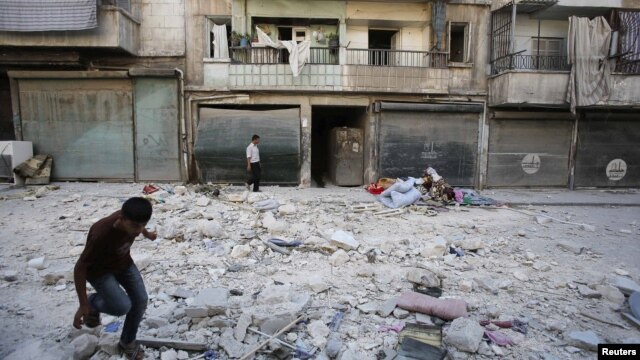Activists: Syrian Troops Kill Hundreds in Daraya
Civilians
stand outside a building after it was hit by shelling from Syrian
government forces in the northern city of Aleppo August 25, 2012.
Activists say Syrian troops have massacred hundreds of people in a town close to the capital.
They say 200 were killed in Daraya, just southwest of Damascus.
The state-run SANA news agency says Daraya had been "purified of terrorist remnants."
The attack on Daraya was part of an army campaign to regain control of the outskirts of the capital.
Activists say Syrian forces with tanks and combat helicopters also launched fresh raids in other cities.
President Bashar al-Assad has blamed foreign-backed terrorists for much of the violence that has gripped his nation for nearly the past 18 months.
On Saturday, SANA said armed forces killed an unspecified number of "terrorists" in Aleppo and destroyed seven vehicles equipped with machine guns.
A VOA reporter who has been monitoring developments in Syria says the situation is becoming more brutal and gruesome. However, he says activists are having an increasingly difficult time getting video and information out of the country because Internet service is cut off in most regions, and little or no electricity is available to recharge electronic devices.
Western powers have urged Assad to resign, but the Syrian leader continues to get support from Iran. On Saturday, an Iranian delegation visiting Syrian lawmakers in Damascus reaffirmed Tehran's support.
The Associated Press quotes Iran's ambassador to Syria, Mohammad Rida Raouf Sheibani, as saying that calls for reforms in Syria have been "masked by plots carried out by enemies."
They say 200 were killed in Daraya, just southwest of Damascus.
The state-run SANA news agency says Daraya had been "purified of terrorist remnants."
The attack on Daraya was part of an army campaign to regain control of the outskirts of the capital.
Activists say Syrian forces with tanks and combat helicopters also launched fresh raids in other cities.
President Bashar al-Assad has blamed foreign-backed terrorists for much of the violence that has gripped his nation for nearly the past 18 months.
On Saturday, SANA said armed forces killed an unspecified number of "terrorists" in Aleppo and destroyed seven vehicles equipped with machine guns.
A VOA reporter who has been monitoring developments in Syria says the situation is becoming more brutal and gruesome. However, he says activists are having an increasingly difficult time getting video and information out of the country because Internet service is cut off in most regions, and little or no electricity is available to recharge electronic devices.
Western powers have urged Assad to resign, but the Syrian leader continues to get support from Iran. On Saturday, an Iranian delegation visiting Syrian lawmakers in Damascus reaffirmed Tehran's support.
The Associated Press quotes Iran's ambassador to Syria, Mohammad Rida Raouf Sheibani, as saying that calls for reforms in Syria have been "masked by plots carried out by enemies."
Some information for this report was provided by AP, AFP and Reuters.


No comments:
Post a Comment